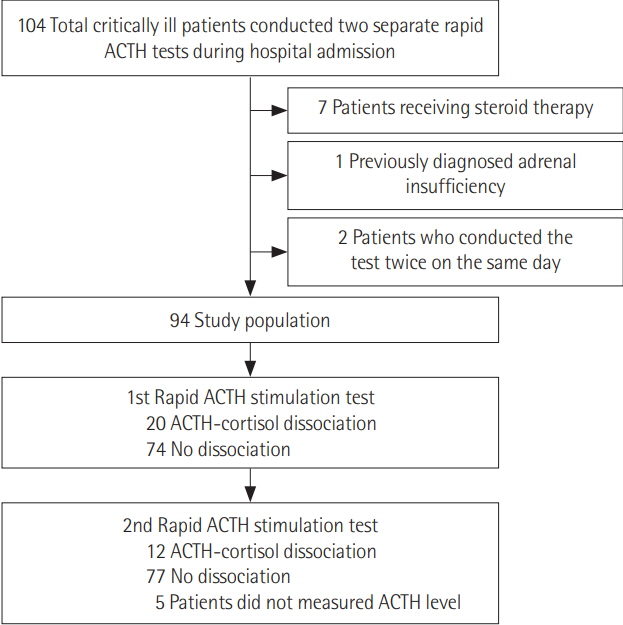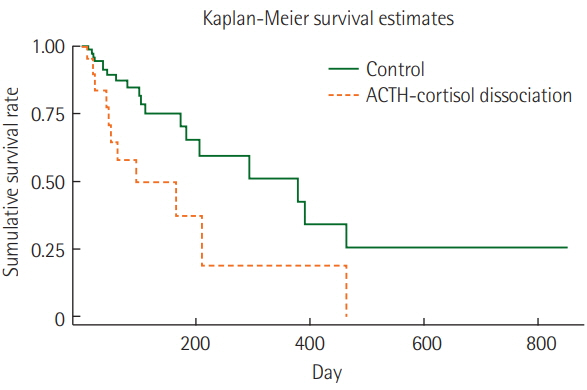Acute Crit Care.
2019 Feb;34(1):38-45. 10.4266/acc.2018.00339.
Prognostic Implication of Adrenocortical Response during the Course of Critical Illness
- Affiliations
-
- 1Division of Pulmonary and Critical Care Medicine, Department of Internal Medicine, Seoul National University Hospital, Seoul National University College of Medicine, Seoul, Korea. realrain7@gmail.com
- 2Division of Endocrinology and Metabolism, Department of Internal Medicine, Seoul National University Hospital, Seoul National University College of Medicine, Seoul, Korea.
- KMID: 2449378
- DOI: http://doi.org/10.4266/acc.2018.00339
Abstract
- BACKGROUND
Critical illness-related corticosteroid insufficiency (CIRCI) and adrenocorticotropic hormone (ACTH)-cortisol dissociation are hormonal conditions frequently observed in patients in the intensive care unit (ICU). The aim of this study was to evaluate the association between ACTH-cortisol dissociation and clinical outcomes of critically ill patients.
METHODS
We retrospectively reviewed the medical records of 94 ICU patients who underwent two rapid cosyntropin tests during hospital admission and compared the clinical aspects of patients with and without ACTH-cortisol dissociation. ACTH-cortisol dissociation was defined as plasma ACTH and serum cortisol concentrations of < 22 pmol/L and >600 nmol/L, respectively.
RESULTS
Dissociation was present in 30 of the 94 patients (31.9%). Patients with ACTH-cortisol dissociation in the initial test had significantly higher hospital mortality rate than those in the control group (55% vs. 25.7%, P=0.013) There was no difference in hospital mortality between patients classified as having CIRCI and those who were not. In multivariate adjusted Cox regression analysis, the mortality risk was higher in the group with ACTH-cortisol dissociation (hazard ratio, 2.98; 95% confidence interval, 1.34 to 6.63; P=0.007). Patients with dissociation in two consecutive stimulation tests showed the highest hospital mortality rate among groups classified according to stimulation test results (100% vs. 31.3%).
CONCLUSIONS
The hospital mortality was higher in ICU patients diagnosed with ACTH-cortisol dissociation. It is clinically feasible to evaluate the presence of ACTH-cortisol dissociation by analyzing rapid ACTH stimulation test results in critically ill patients.
MeSH Terms
Figure
Cited by 1 articles
-
Comparison of salivary and serum cortisol levels in mechanically ventilated patients and non-critically ill patients
Jung Hee Kim, Yoon Ji Kim, Sang-Min Lee, Jinwoo Lee
Acute Crit Care. 2020;35(3):149-155. doi: 10.4266/acc.2020.00297.
Reference
-
1. Annane D, Pastores SM, Arlt W, Balk RA, Beishuizen A, Briegel J, et al. Critical illness-related corticosteroid insufficiency (CIRCI): a narrative review from a Multispecialty Task Force of the Society of Critical Care Medicine (SCCM) and the European Society of Intensive Care Medicine (ESICM). Intensive Care Med. 2017; 43:1781–92.
Article2. Annane D, Pastores SM, Rochwerg B, Arlt W, Balk RA, Beishuizen A, et al. Guidelines for the diagnosis and management of critical illness-related corticosteroid insufficiency (CIRCI) in critically ill patients (part I): Society of Critical Care Medicine (SCCM) and European Society of Intensive Care Medicine (ESICM) 2017. Crit Care Med. 2017; 45:2078–88.3. Rothwell PM, Udwadia ZF, Lawler PG. Cortisol response to corticotropin and survival in septic shock. Lancet. 1991; 337:582–3.
Article4. Freund Y, Jabre P, Mourad J, Lapostolle F, Reuter PG, Woimant M, et al. Relative adrenal insufficiency in critically ill patient after rapid sequence intubation: KETASED ancillary study. J Crit Care. 2014; 29:386–9.
Article5. Kwon YS, Kang E, Suh GY, Koh WJ, Chung MP, Kim H, et al. A prospective study on the incidence and predictive factors of relative adrenal insufficiency in Korean critically-ill patients. J Korean Med Sci. 2009; 24:668–73.
Article6. de Jong MF, Beishuizen A, Spijkstra JJ, Groeneveld AB. Relative adrenal insufficiency as a predictor of disease severity, mortality, and beneficial effects of corticosteroid treatment in septic shock. Crit Care Med. 2007; 35:1896–903.
Article7. Annane D, Bellissant E. Prognostic value of cortisol response in septic shock. JAMA. 2000; 284:308–9.
Article8. Pandya U, Polite N, Wood T, Lieber M. Increased total serum random cortisol levels predict mortality in critically ill trauma patients. Am Surg. 2014; 80:1112–8.
Article9. Kwon YS, Suh GY, Kang EH, Koh WJ, Chung MP, Kim H, et al. Basal serum cortisol levels are not predictive of response to corticotropin but have prognostic significance in patients with septic shock. J Korean Med Sci. 2007; 22:470–5.
Article10. Suresh R, Wig N, Panda PK, Jyotsna VP, Chaturvedi PK, Pandey RM. Serum cortisol level in Indian patients with severe sepsis/septic shock. J Emerg Trauma Shock. 2017; 10:194–8.
Article11. Raff H, Biru N, Reisinger N, Kramer DJ. Dissociation of ACTH and cortisol in septic and non-septic ICU patients. Endocrine. 2017; 55:307–10.
Article12. Boonen E, Van den Berghe G. Cortisol metabolism in critical illness: implications for clinical care. Curr Opin Endocrinol Diabetes Obes. 2014; 21:185–92.13. de Jong MF, Beishuizen A, van Schijndel RJ, Girbes AR, Groeneveld AB. Risk factors and outcome of changes in adrenal response to ACTH in the course of critical illness. J Intensive Care Med. 2012; 27:37–44.
Article14. Bagate F, Lellouche N, Lim P, Moutereau S, Razazi K, Carteaux G, et al. Prognostic value of relative adrenal insufficiency during cardiogenic shock: a prospective cohort study with longterm follow-up. Shock. 2017; 47:86–92.



